Emnekart 2006
This was the fourth Norwegian Topic Maps conference (emnekart is Norwegian for Topic Maps), and for the first time it was not entirely in Norwegian, as this year there was an English track through the whole conference. It was also the first year the conference sold out.
First plenary session
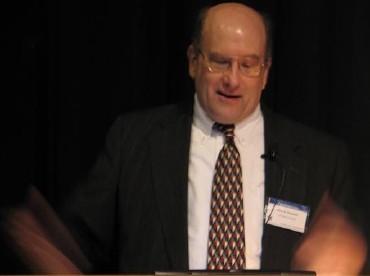
Steve Newcomb presenting |
This year we were lucky to get Steve Newcomb as the keynote speaker. He was billed on the program as "the inventor of Topic Maps", and characteristically spent the first part of this talk denying that he was the "father of Topic Maps" although he admitted being "present at the birth". His talk was on The Topic Maps Attitude, but unfortunately I missed most of it, as I was working on my own presentation. It seemed to be mostly a philosophical presentation on the attitudes and intentions behind the design of Topic Maps.
Following Steve was me, with a presentation based on my Metadata? Thesauri? Taxonomies? Topic Maps! paper, which I've spent two years now on refining. I still don't think it's entirely there, but I think the basic message came across. The message is essentially that if you want to make documents findable you need metadata, but that metadata is inevitably geared towards the documents, where what users care about is the subjects. Taxonomies and thesauri provide mechanisms for letting users start from subjects to find information, but those models are very limited and restricted compared with Topic Maps, which can also represent metadata. Well, see the slides or the paper if you want the detail.
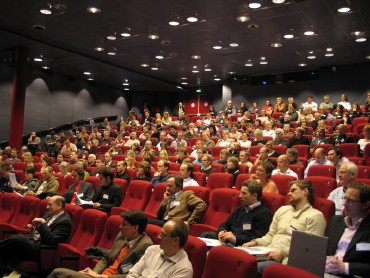
The audience |
I was followed by an Exhibitor's Forum, where all the exhibitors were lined up in front of the audience and got three minutes each to present themselves. I've tried this myself elsewhere, and it's horrible for the presenters, but usually very helpful for the audience.
The English track
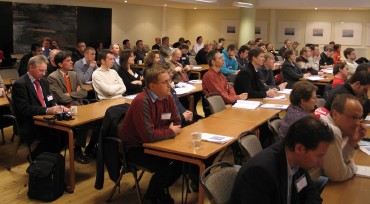
The audience (English track) |
The Exhibitor's Forum ended the initial plenary session, and was followed by a Norwegian and an English track. I went for the English track where Jochen Schwarze was talking about the use of Topic Maps for Stuttgart's municipal portal (called KORVIS). The portal is an internal administrative portal for elected politician, basically intended to remove the problem that politicians need to access up to 20 different systems to find relevant information. Instead, the keywords and key metadata from these systems is extracted automatically using harvesters to produce a topic map. A search interface is presented based on this topic map, but only shows document results from the various subsystems. The documents, however, are not stored in the topic map, so the actual searching is mostly farmed out to the subsystems.
He listed as key benefits of Topic Maps: the flexibility, the fact that it's detached from the subsystems, the merging logic, and also the fact that they have such rich semantics. He likened existing solutions to an "information jungle" (uncontrolled and wild), and called Topic Maps an "information garden".
The hurdles they faced were mostly cultural ("city councillors are not exactly early technology adopters, as you may imagine", and also that the politicians don't necessarily want too much transparency.) There were also weaknesses in the subsystems. The tool used wasn't as mature as typical RDBMS tools, and there were some performance issues they had to use indexes to get around.
In the Q&A he said that although they so far only use existing metadata from the subsystems, but that they are considering to start using NLP technology to extract more. It also emerged that they are based on TM4J.
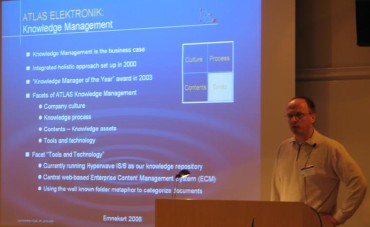
Ingo Schönfeld |
The next speaker was Ingo Schönfeld of ATLAS ELEKTRONIK, on "Managing Knowledge in the Development Process". Atlas produces electronics for the defense sector, primarily navies, and also do some civilian work. I think he said they have 1300 employees. They consider Knowledge Management to be a key challenge that has to be met in order for them to remain competitive. So in this case, the project was about supporting Atlas knowledge management using Topic Maps. Today they use Hyperwave IS/6 as their KM system; Ingo described it as a "traditional Enterprise Content Management system (ECM)". According to Ingo, typical ECM-KM solutions only manage the containers for knowledge, the documents, whereas Atlas really needs to handle the knowledge itself: arbitrary subjects, subject relationships, knowledge structure. In other words, they don't want a document-oriented system because people don't think in terms of documents (or folders), but in terms of subjects with relationships.
Ingo emphasized the use of Enterprise Information Integration (EII) to collect information into the topic map, and then to use microarticles as "content particles" connected to the topics. The microarticles get types (experience, best practice, lessons learned, ask the expert, ...). This sounds a lot like DITA to me.
At Atlas they use harvesters on top of Hyperwave, existing databases, and file systems to build a topic map with a predefined ontology (predefined for the harvesters). There is a web application based on the topic map that provides search and navigation of the resulting topic map. He uses merging to connect other systems (HR was the example) into this, and showed an example of this, where merging adds information to the web page about an employee. Users also get an interface where they can add their own thoughts and associations to the topic map.
The system provides a single point of access to all relevant information, to get out of the situation where the user is spread around in different systems where the user has to know in which system to find it. Another benefit is that this is EII, rather than EAI, and so much cheaper. They found that users become more interested in Topic Maps when the system makes the users' content available in other contexts and applications.
The last speaker in the international track was Henri Melger from the Dutch Tax Office (DTO) on "Integrating publication silos". The publications in questions are tax laws and related content. This information is important to them because, obviously, their job is to enforce these laws, and to do so consistently. His goal is to spend less on content maintenance, and at the same time get improved information retrieval.
The information consists of the laws, jurisprudence, and policy documents, enriched with commentary, explanations, interpretations, and learning material, etc. Today DTO has an intranet called (Bnet) with 20 million pages, based on 1500 sources. Their content suppliers are 25 commercial publishers, and 275 governmental suppliers. In addition come 22 intranets for parts of the organization.
One problem is that their legal information comes from different sources, and so winds up being disconnected, in different formatting, duplicated, lots of manual updating, etc etc, and in addition each source has its own navigation and search. These are the publication silos of his title, and for the users this is a big problem, as it's hard to find anything, or to see the complete view of what they have. Clearly, this is an expensive situation to be in.
So his project is about integrating the publications across the silos automatically, without getting the sources to change what they provide. One goal is to change what they buy, so that they can start paying only for the enrichments (the base materials they already have). At the moment they are at the experimental stage, but have built a topic map that connects the different pieces together based on identifiers for the individual parts of the content. (Breebart!) So far their topic map has 1.5 million topics, which covers 17,000 Dutch laws.
So why did they choose Topic Maps? The complex relations are easily modelled in Topic Maps, relations can be traversed in both directions, identification and merging support, and because it's a standard.
Problems: they had performance issues with the input procedure, and he showed a nice graph that shows how OKS 3.0 really improves the performance over OKS 2.2, which was gratifying. They worked around this by writing their own input procedure against the API (instead of just using XTM import). Also some performance issues in the display part, primarily with the tree view, it seems.
The Norwegian track
I chose not to attend the Norwegian track as I knew the projects presented there already, but here's a short summary for those of you who don't know Norwegian:
- Ibsen's works online using Topic Maps, by Elise Østbø Jansen of the University of Oslo. About a project to create an online version of the multi-volume series of Ibsen's works published on paper this year. The project uses quite a lot of highly semantic XML markup of all the content, so the topic map is likely to be quite rich and navigable.
- The seamless municipality — from vision to reality, by Christer Gundersen of KS (the umbrella organization for Norwegian municipalities). I've no idea what the content of this talk was, unfortunately.
- Integration of municipal services with MyPage.no, by Svein Ølnes of Vestforsk (a research institute). This project is describing the steps involved in public services from a citizen point of view and working to connect the resulting topic map with resources published on the sites of the organizations responsible for the services.
Exhibition
The conference also had an exhibition, which I never got time to study or take proper pictures of, but there were quite a few exhibitors. In no particular order:
- Ontopia, of course
- Bouvet (Norwegian consulting house)
- Creuna (ditto)
- OfficeNet (vendors of web CMS with Topic Maps support)
- the Norwegian Ibsen Centre (they're doing a Topic Maps project)
- NetworkedPlanet
- Making Waves (Norwegian CMS vendor)
- Ovitas
The exhibition seemed pretty busy throughout, and especially in the first break, when I had to struggle to get to the Ontopia booth at all so I could leave my laptop there.
Workshop
After lunch Graham Moore and I gave a technical workshop which effectively consisted of us answering questions from the audience. We'd received some in advance (which we'd prepared slides to), and we got many more during the workshop (some of which we'd cheated and made slides for because we knew they'd show up). It was pretty good, with no lack for questions, and quite a bit of interest from the audience (I felt, anyway).
The other two tracks
In this case I know less about the other presentations (not attended, for obvious reasons), but I think Are Mjølsnes's presentation is worth a mention anyway. He described a project run by the Norwegian Education Directorate to represent the national curriculum as a topic map. Now that's something...
Final plenary session
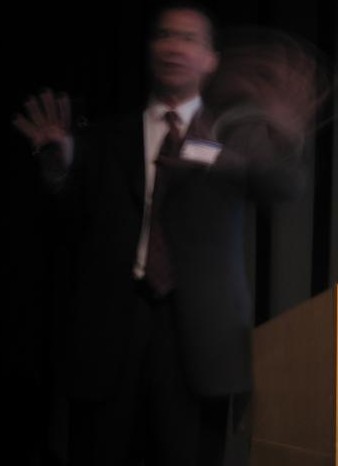
Sorry, George (not enough light) |
The first speaker in the final plenary session was George Kondrach of Innodata Isogen, talking about Knowledge Management in Intelligence Communities. These communities are often resistant to change (old workforce), and equally resistant to the open flow of self-descriptive information (because they basically don't like to share information). Originally, they tried to use XML and XML Schema for knowledge management, but have pretty much given this up by now. The information is distributed via an internal portal.
Started the technical discussions around Topic Maps in 2003, mostly with Isogen staff and Steve Newcomb. Long and hard road with lots of political difficulties internally in the intelligence agency, but also with other contractors. Today they have a directorate sponsorship, which is quite a feat, and a testament to the effectiveness of Topic Maps.
They've done two pilots, one about tracking surface commercial vessels and their cargoes (2004), and the second on submarines (2005). The point of the first is to find discrepancies between stated routes of travel and cargo with observations made of the ships. The second is about the various types of submarines, and their properties. George can't say too much about either, as they are both classified.
After this went Åsmund Mæhle (from Bouvet) on the Knowledge Management Forum of the Norwegian Computer Society, which arranged this conference together with the Norwegian Topic Maps community. He spoke mainly on the KM Forum and future activities around emnekart.no, but also mentioned future events, like the annual Norwegian KM conference.
Next was Lutz Maicher of the University of Leipzig talking about the TMRA conference in Leipzig, which is focused on research, but will in 2006 also have an industrial track. Lutz also waved around a copy of the proceedings from TMRA'05, which he received last week. I still haven't got mine, but got a brief look at it while Steve Newcomb leafed through Lutz's copy.
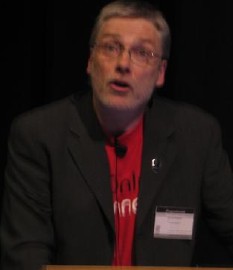
Steve speaking |
The final speaker was Steve Pepper, on "the Shape of Topic Maps to Come", which was effectively a SWOT analysis of Topic Maps. The strengths, according to Steve were, ... He also claimed that in Norway, Topic Maps have crossed the chasm, and is now starting to be adopted by the "early majority". According to him, the bridgehead across the chasm is the public sector portals in Norway. Interestingly, he moved on to the results from Sam Oh's comparative study of the effects of Topic Maps on information retrieval, which look very good for Topic Maps.
The weaknesses listed by Steve were primarily a lack of tools, insufficient penetration of industry, not enough academic work, a lack of books, no big players, and one more I couldn't catch. The next subject, inexplicably, was an update on the state of the standards flew by, but too quickly for me to capture it.
The opportunities were summarized as "enormous!", which Steve claimed was "not just a visionary madman talking", raising a laugh. Steve's analysis is that the market really is ready for this, and that we should be much better at talking about what we are doing.
The threats flew by too quickly. Sorry. You have to look at the slides. One was that most projects don't use the full power of Topic Maps, but instead restrict themselves to topics, associations, and occurrence. Steve moved into a discussion of scope and reification to show what we were missing out, with special emphasis on merging (with a short deviation into the National Knowledge Base, inevitably).
The end
After his talk Steve embarrassed the other Steve royally by calling him down in front of the audience and giving him a first edition of "An Enemy of the People" by Ibsen (a quotation from which was used as the theme of the conference). And that was the end of the conference. True to tradition we celebrated the end of another successful conference at Beer Palace.
Similar posts
TMRA 2007 — day 1
As usual, the conference was opened by Lutz, who gave a short introduction based around the conference motto of "Scaling Topic Maps"
Read | 2007-10-11 18:13
Norwegian Topic Maps Users' Group Meeting
The Norwegian Topic Maps Users' Group had one of its irregular meetings tonight, with talks on various subjects, plus updates on the administrivia of the users' group itself
Read | 2006-08-16 21:43
TMRA 2007 — day 2
The first talk I attended was by Robert Barta on Knowledge-Oriented Middleware using Topic Maps (abstract)
Read | 2007-10-13 23:52
Comments
Liangbing Zhu - 2006-03-29 18:38:13
I'm confident of Topic Maps. Thank you for your significative work and I'm your fan! :) Let's go on!
Lars Marius - 2006-03-30 22:20:03
Thank you, Liangbing. There's no going back now, that's for sure...
Sven Ryen - 2006-03-31 11:18:42
Hi, and thanks for an excellent conference! Great wrap-up, though it seems like you've left out the best part: Strengths of Topic Maps...
Cheers!
Lars Marius - 2006-03-31 11:37:19
Thank you, Sven. I'm afraid Steve was just going way too quickly for me to catch the strengths. It's in the slides anyway. :)
Liangbing Zhu - 2006-03-31 17:37:01
Can you tell me where I can download the slides about the conference?I can't find it.:( Thanks!
Lars Marius - 2006-03-31 21:00:22
It turns out that the slides have been posted, at http://forum.dataforeningen.no/showthread.php?t=260.
Steve Pepper - 2006-04-01 13:15:18
I'm not surprised Lars Marius wasn't able to catch everything I said. I had a lot on my mind and wanted to leave plenty of time for the final presentation. I talked fast (and got a telling off at the end from Paul Elzinga's signer, who got cramp trying to keep up :-)
Anyway, it was a great conference. Thanks again to all the attendees and speakers.
By the way, Liangbing: There will be a Topic Maps conference in Seoul, South Korea, on June 2nd, called the Asian Topic Maps Summit. Both Lars Marius and I will be speaking there. Is there any chance you could come? The program will be published in a couple of weeks from now. I'm sure Lars Marius will mention it in his blog as soon as details are available, but the date and location are already fixed.
Liangbing Zhu - 2006-04-10 06:38:47
It's a good chance for all the people in Asia who are interesting in Topic Maps.I also extremly want to catch this chance.But my current condition can't permit me to do so.what's a pity!
Steve Pepper - 2006-05-15 01:45:16
It's a pity you won't be able to attend, Liangbing. The AToMS web site is now available at http://www.kssn.net/atoms/eng/index.html Please help publicize the event in China.